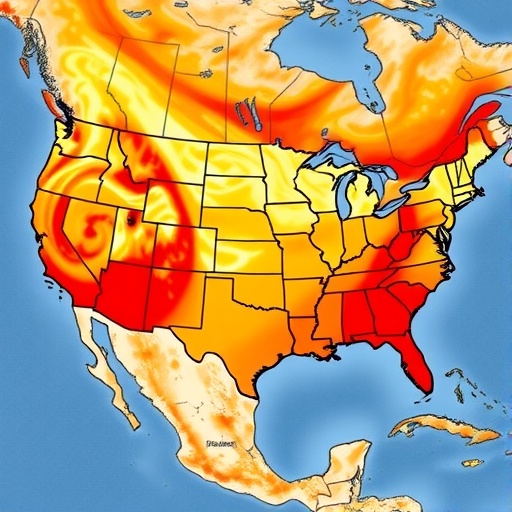In recent years, the accumulation of scientific evidence has increasingly highlighted the transformative effects of climate change on weather patterns and extreme events. Among these, heat waves stand out for their devastating impact on ecosystems, human health, and economies. A groundbreaking study published in the journal “Commun Earth Environ” by Skinner, Touma, and Barlow offers a detailed analysis of how the spatial extent of heat waves has evolved over the past four decades. As global temperatures continue to rise, understanding these shifts is vital for improving predictions and enhancing our preparedness for future heat events.
The study meticulously examines historical data from a range of sources to assess the changes in the frequency, duration, and extent of heat waves across different regions. Researchers have employed advanced statistical models and climate reanalysis data to paint a comprehensive picture of transitions in heat wave characteristics. By focusing on large-scale patterns, they aim to identify underlying drivers, revealing the systemic shifts that are altering our climate landscape.
One of the most striking findings of the research details the geographical spread of heat waves. The data shows that regions once relatively insulated from extreme heat are now experiencing increased frequency and intensity of heat waves. This shift is particularly pronounced in temperate zones, where climates traditionally characterized by moderate temperatures are now being subjected to more severe heat events. Such changes not only threaten agriculture and biodiversity but also pose serious risks to public health.
Moreover, the study highlights how urbanization plays a significant role in amplifying the effects of heat waves. As cities expand and populations grow, urban heat islands emerge, creating localized areas that suffer from significantly elevated temperatures compared to their rural surroundings. This phenomenon exacerbates the health risks associated with heat waves, particularly among vulnerable populations such as the elderly and those with existing health conditions.
Another key aspect addressed by the researchers is the role of climate variability, particularly the El Niño Southern Oscillation (ENSO) and other climatic phenomena, in modulating heat wave occurrences. Their analysis suggests that periods of high ENSO activity correlate with heightened heat wave intensity, underscoring the complexity of climate interactions. As the frequency and magnitude of these events shift over time, the implications for policy and disaster management become increasingly urgent.
In addition to the physical changes in heat wave patterns, the researchers emphasize the socio-economic implications. The rising intensity and the expanding geographic reach of heat waves can have profound effects on agriculture, water resources, and energy demand. Farmers face challenges in crop productivity, with heat stress and water scarcity potentially leading to reduced yields. On the energy front, increased air conditioning demand during intensified heat waves can strain power grids, leading to outages and increased emissions from fossil fuel-generated electricity.
Another crucial point raised in the article is the interaction between different climate-related events. The occurrence of droughts with heat waves can substantially increase fire risks, threatening both natural landscapes and human settlements. The study thoroughly discusses the interconnectedness of these phenomena, demonstrating the need for integrated approaches to climate resilience that account for multiple stressors simultaneously.
The authors also take a moment to highlight potential adaptive measures. They advocate for better urban planning and infrastructure design that can mitigate heat impacts, such as increasing green spaces and promoting reflective surfaces in buildings. By developing strategies that can withstand and adapt to heightened heat stress, communities can effectively reduce vulnerabilities and enhance quality of life for their residents.
Education and outreach are also pivotal components in combating the effects of heat waves. The research underscores the importance of informing the public about heat risks and effective preventive measures. Communities must engage in proactive dialogue about heat health, emphasizing the need for cooling centers and resources for those most at risk during extreme heat events.
Peer-reviewed studies like this one form a crucial part of the climate discourse, driving home the urgency of addressing climate change. The authors call upon policymakers to use their findings as a basis for crafting actionable strategies, reinforcing the importance of linking scientific knowledge with governance frameworks. It’s a clarion call for enhanced collaboration between scientists, government agencies, nonprofit organizations, and affected communities.
In conclusion, the study by Skinner and colleagues provides a sobering yet necessary perspective on the future trajectory of extreme heat events. By meticulously documenting shifts in heat wave patterns over the past four decades, the authors have laid the groundwork for future research and policy development. Their work serves as a powerful reminder of the need for continued vigilance in understanding how climate change reshapes our world and the urgent actions required to mitigate these shifts.
As the world grapples with the implications of climate change, studies like these are instrumental in highlighting the critical need for adaptation and resilience. The ongoing research efforts in this domain are essential to facilitate discussions about sustainable practices and innovative solutions to safeguard against increasingly hostile climate conditions.
Through collaborative efforts and informed strategies, society can hope to navigate the complexities of climate change and pave the way for a more sustainable and resilient future for generations to come.
Subject of Research: Changes in the spatial extent of heat waves over the past four decades
Article Title: The spatial extent of heat waves has changed over the past four decades.
Article References:
Skinner, C.B., Touma, D., Barlow, M. et al. The spatial extent of heat waves has changed over the past four decades.
Commun Earth Environ 6, 662 (2025). https://doi.org/10.1038/s43247-025-02661-y
Image Credits: AI Generated
DOI: 10.1038/s43247-025-02661-y
Keywords: Heat waves, climate change, urban heat islands, agricultural impact, policy implications.




